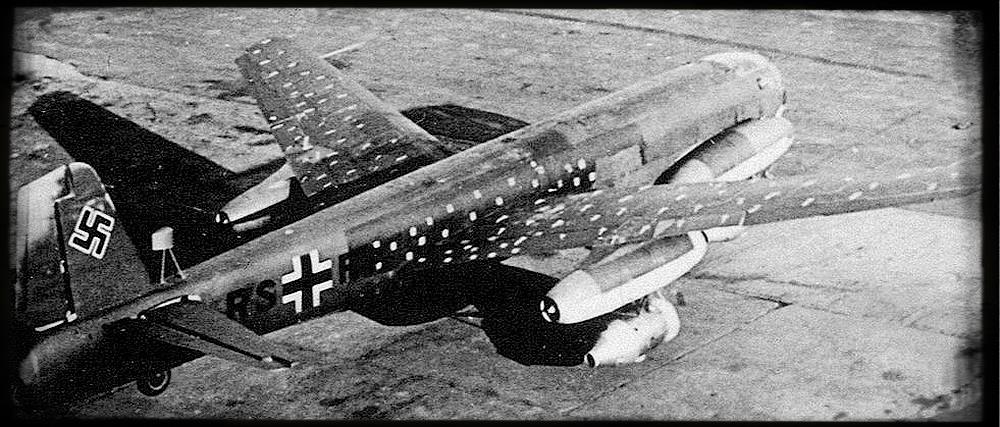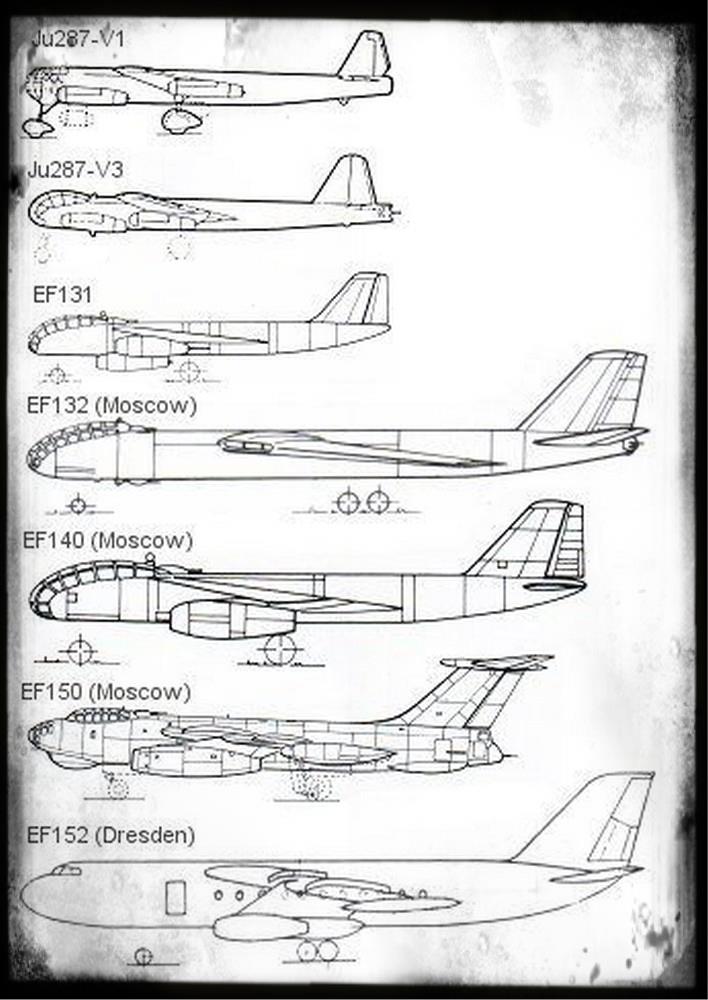Junkers Ju287 (Jet Bomber)
see also: Junkers Ju287 Production List / Junkers Ju287 Model Kits
bomber jet aircraft, 2 built, F/F 16.08.1944, cantilever monoplane, smooth metal The first wind channel models were designated EF55 to EF59. The EF55 to EF57 seemed to be used for wing researches as they do not show any engines under wing or at the fuselage. The EF55 had forward swept wings, while the EF56 had positive swept wings. Also the EF56 was used for flap trials with large flap extensions, as they were needed for high speed aircraft. In October 1943 the EF57 was tested with positive swept wings again, which were folded at the outer wing areas.
designed by Hans Wocke and Fritz Freytag, continued by Brunolf Baade after WWII 
Junkers Ju287-V1
In 1942 the RLM asked Junkers for the development of a jet powered heavy bomber aircraft. The developement of the Ju 287 was started in autumn 1942 by Wocke. Due to aerodynamic reasons, Wocke decided to design the Ju287 with forward swept wings. Several experimental windchannel designs were developed to get conclusions about the wing design and the best positions for the jet engines:
Wing studies were continued with EF58, which got an elliptic forward swept wing form and EF59 with forward swept wing and nose flaps. Both wind channel models also show some engine mountings. The EF58 had classic under wing engines, while the EF59 had four engines, two under wing and two at the forward fuselage area. The EF59 of autumn 1943 was already a nearby of the later Ju287 design. However further wind channel models were used under the designator EF66 and later.
The wind channel models EF66 to EF68 were the next test steps toward the Ju 287 following the initial test series of the EF55 to EF59. Both models had already the forward swept wing, which Wocke find to be the best wing form for a larger jet aircraft. The major purpose of this test series was to find the best engine position. The EF66 combined the EF55 forward swept rectangle wing with the EF58 engine mounting under the wing. The EF68 got an engine pair at the fuselage. It seems as if this engines were movable, so that best position could be evaluated on this model.
The EF116 is a developement designator for the Junkers Ju287 of Spring 1943. This model was mainly used for evaluation of the possible forward and backward swept wings. No detailled fuselage or engines were used on this model
The final step to the Ju 287 was the EF 122 wind channel model. The EF122 seemed to be the accurate test model for the Ju287V1. Its nose section, the forward swept wings and the engine positions are exactly in the position of the V1.
The last EF model known for the Ju287 developement was the EF125. It seemed to be a model for the final Ju287 serial aircraft, but is just equipped with two Jumo 012 or BMW 018 engines. It has a forward swept span of 19,40 meters. It was the previous DFS125 design. The EF122 is very similar to the V3 and the later EF140 series. 
Junkers Ju287-V1 Prototype
The above studying models were used to find the best wing design for multi engined jet aircraft. The Ju287-V1 was built to test the final wing design of the EF122. For getting quicker results, the Ju287 Prototype was built with components of several existing aircraft types. The fuselage was taken from a Heinkel He 177A-3, the tail was taken from the Junkers Ju188G-2, while the undercarriage came from an American Liberator bomber, which was captured over Germany. Two Jumo 004 engines were mounted under the rear wing, while a further two were placed at the forward fuselage near the cockpit section. When the Ju287V1 prototype was ready, it was transported to Leipzig-Brandis, as the runways at Dessau were to short for take off. On August, 8th 1944 Siegfried Holzbaur performed the first flight with Ju287V1 at Leipzig. The flight tests were satisfying and they proofed the forward swept wing design. Several tests were also performed with HWK-502 starter rockets, which should reduce the take off runway. Parachutes were used to reduce the aircraft speed after touch down. A total of six preseries Ju287 were planned:

Developement of the EF122/Ju287
up to the EF152 Passenger Airliner of 1955
While the second prototype was under construction, the RLM advised Junkers to stop the developement work of the Ju287 in advance of the "Fighter Program". But in March 1945 the program was relaunched by the RLM and a request for a serial production of 100 aircraft per month was placed. The serial production for these aircraft should have been performed by Allgemeine Transportanlagen GmbH at Leipzig and the serial aircraft should have been equipped with the Jumo 012.
The Ju287V1 was destroyed during the occupation phase of the Soviet forces in April 1945. But at Dessau the Soviets continued the construction of the V2 and V3, which were flown in summer 1945. Baade continued the developement of the Ju287 under Soviet leadership. The Junkers EF131 was a reverse reengineered Ju287. Based on the EF131 Baade developed the EF140 and EF150 later in Russia.
Hans Wocke moved later to West Germany and became the responsible design engineer at Hamburger Flugzeugbau. Here he designed the HFB320 business jet, which was characterized by its forward swept wing. This wing design of course was directly influenced by the Ju287 design, which Wocke had started at Dessau in 1944 and which was continued 20 years later with the HFB320.
Technical Data:
| Aircraft | year | engine | length in m | span in m | wing area im sqm | net weight in kg | payload in kg | seats | speed in km/h | range in km |
|---|---|---|---|---|---|---|---|---|---|---|
| EF116 | 1943 | 4 x Jumo 004H | 22,10 | 26,50 | n/a | n/a | 4000 | 2 | 980 | 5500 |
Weblinks:
- CIA.gov - CIA Report about Ju287 (CIOS)
- Airwar.ru - Ju287 Story, Data, Photos
Airwar.ru - EF132 Story, Data, Photos - Wikipedia.org - Ju287 Story, Data, Drawings
- Airpages-ru - Ju287 Story, Data
- MilitaryFactory.com - Ju287 Story, Data
- Flugzeug-Lorenz.de - Ju287 extract from "Kennzeichen Junkers"
Literature:
- F. Kober
Die ersten der Strahlbomber der Welt: Ar234 und Ju287
published by Podzun-Pallas Verlag, Friedberg, 1980
ISBN No. 3-7909-0122-9, Waffenarsenal Bd. 61 - Thomas Hitchcock
Junkers Ju287
published by Monogram Aviation Publ., 1974, ISBN No. 914144014 - Horst Lommel
Junkers Ju287
published by Aviatik Verlag, June 2003, ISBN No. 3-925505-74-1 - Stephen Ransom
Junkers Ju287: Germany's Forward Swept Wing Bomber
Ian Allan Ltd., 2008, ISBN 978-1903223925 - Horst Lommel
Junkers Ju287 + Ju EF131
Luftfahrt Historie No. 16
introduced Jul 1996, transfered Aug 2017
http://hugojunkers.bplaced.net/
contents last updated 23 Aug 2017

